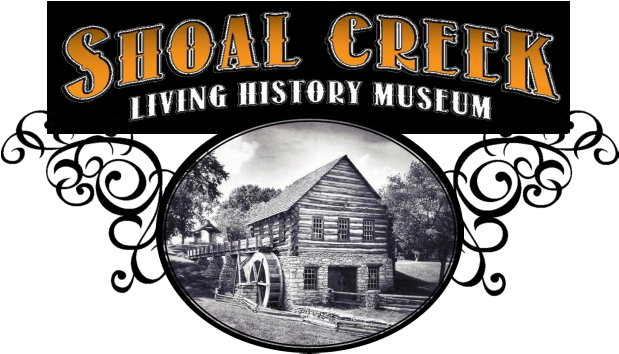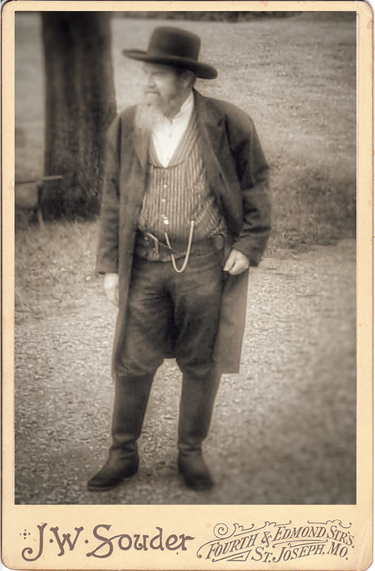
Lester Williamson
My name is L.A. Williamson. I was born on September 17, 1836 in Hopkinsville, Christian County, Kentucky. My parents moved to Independence, Jackson County, Missouri in 1845. My pa was a carpenter while my ma took care of me and my 7 siblings. In 1856 I moved to Clay County Missouri near Liberty and opened my own carpenter shop. I moved back outside Independence after my father’s death and took over his shop. In 1860 I met and married Mary Josephine Younger, sister of younger brothers. We had two children, Jeptha born in 1862 and Margaret born in 1864. After hostilities began, I rode with Captain W.C. Quantrell and was present on most of his operations, including Lawrence, KS. While I was away, I got word that my homestead had been burned and my property stolen. My family was made destitute by Yankee soldiers.
I ended up in Shoal Creek, Clay County, MO due to tracking down the yankee General who ordered my home destroyed. The last yankee officer I dispatched told me the General’s name was something like “Crow Foot”. I was told that he may now be running the town newspaper. I feel that I’m getting close to finding him to make him pay for his mistake. That will be the end of a long journey. After I finish my mission, I will rejoin my brothers-in-law and the James boys .
My name is L.A. Williamson. I was born on September 17, 1836 in Hopkinsville, Christian County, Kentucky. My parents moved to Independence, Jackson County, Missouri in 1845. My pa was a carpenter while my ma took care of me and my 7 siblings. In 1856 I moved to Clay County Missouri near Liberty and opened my own carpenter shop. I moved back outside Independence after my father’s death and took over his shop. In 1860 I met and married Mary Josephine Younger, sister of younger brothers. We had two children, Jeptha born in 1862 and Margaret born in 1864. After hostilities began, I rode with Captain W.C. Quantrell and was present on most of his operations, including Lawrence, KS. While I was away, I got word that my homestead had been burned and my property stolen. My family was made destitute by Yankee soldiers.
I ended up in Shoal Creek, Clay County, MO due to tracking down the yankee General who ordered my home destroyed. The last yankee officer I dispatched told me the General’s name was something like “Crow Foot”. I was told that he may now be running the town newspaper. I feel that I’m getting close to finding him to make him pay for his mistake. That will be the end of a long journey. After I finish my mission, I will rejoin my brothers-in-law and the James boys .
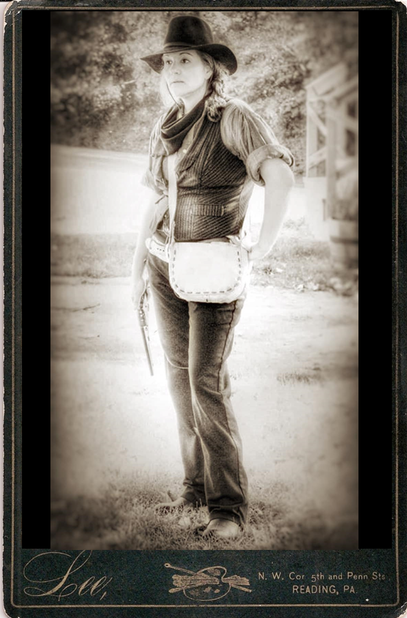
Deena Roe
My name is Bad Betty. I am an outlaw from Platte County, Missouri. I have rode with the James/Younger gang on several occasions. It was on one of those occasions that I met my dear friend, Belle Starr. Many do not know that she has traveled to Shoal Creek several times and would stay with my cousin. I am not going to say where my current location is....I am wanted!
My name is Bad Betty. I am an outlaw from Platte County, Missouri. I have rode with the James/Younger gang on several occasions. It was on one of those occasions that I met my dear friend, Belle Starr. Many do not know that she has traveled to Shoal Creek several times and would stay with my cousin. I am not going to say where my current location is....I am wanted!
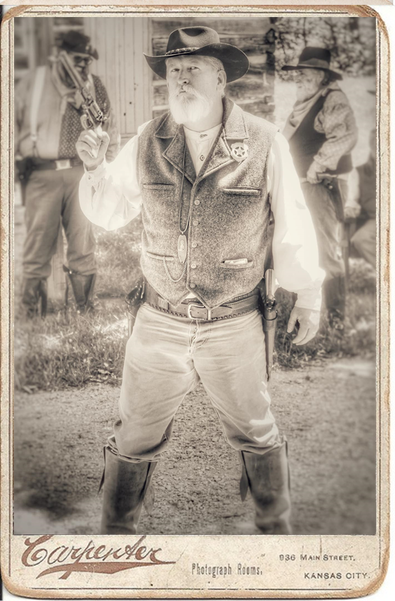
Joseph Roe
My name is J.R. Roe. My birth date is 1830 while on a wagon train west. My Father (Doc Roe) became the town doctor and Mother was the schoolmarm of Platte City, Missouri in 1836. I attended Humbolt Medical College 1856 in St. Louis, Missouri to follow my father in the medical field. I was a physician during the Civil War and had to attend to soldiers from both the North and South. In 1865 I settled down in the town of Shoal Creek, Missouri. I built a small cabin and became the town doctor. Trouble came to town in February of 1866 after the bank in Liberty, Missouri was robbed. The Sheriff of Shoal Creek was run out of town by the James / Younger gang. I decided to run for Sheriff since I could see more money in it then doctoring. I am currently the Sheriff of Shoal Creek, Missouri and always ready for outlaws to visit my jail.
My name is J.R. Roe. My birth date is 1830 while on a wagon train west. My Father (Doc Roe) became the town doctor and Mother was the schoolmarm of Platte City, Missouri in 1836. I attended Humbolt Medical College 1856 in St. Louis, Missouri to follow my father in the medical field. I was a physician during the Civil War and had to attend to soldiers from both the North and South. In 1865 I settled down in the town of Shoal Creek, Missouri. I built a small cabin and became the town doctor. Trouble came to town in February of 1866 after the bank in Liberty, Missouri was robbed. The Sheriff of Shoal Creek was run out of town by the James / Younger gang. I decided to run for Sheriff since I could see more money in it then doctoring. I am currently the Sheriff of Shoal Creek, Missouri and always ready for outlaws to visit my jail.
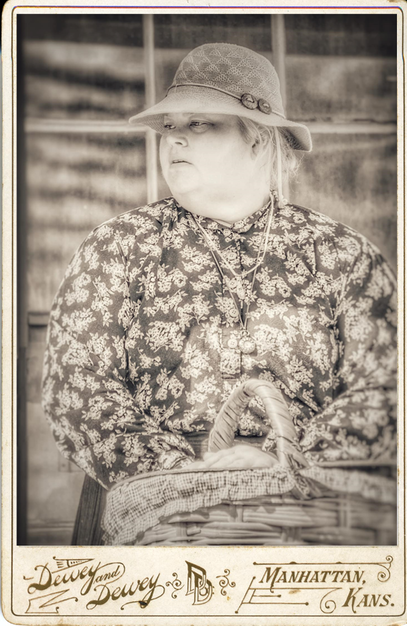
Rebecca Jackson
I am Miss Becky. I have had to take a stand against injustice in Shoal Creek most of my life. I have defended my family’s farm from the corrupt Sheriff to taking a stand for my right to have a say in how the law is made. My gun is ready & at my side if it has to come to that. If laws do not include me then they do not apply to me.
I am Miss Becky. I have had to take a stand against injustice in Shoal Creek most of my life. I have defended my family’s farm from the corrupt Sheriff to taking a stand for my right to have a say in how the law is made. My gun is ready & at my side if it has to come to that. If laws do not include me then they do not apply to me.
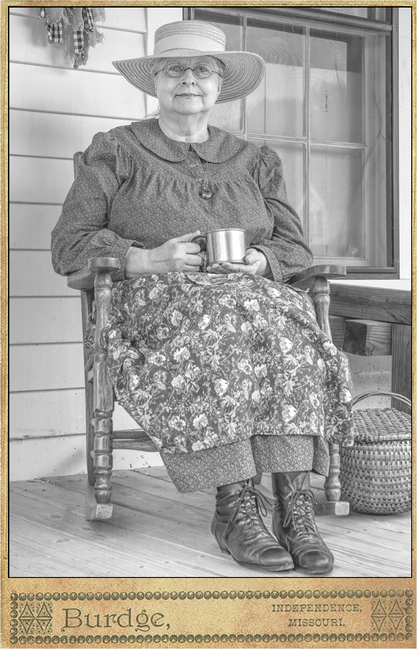
Betty Thayer Kunkel
My name is Elizabeth Rebecca Bealmer Wright but all my kinfolk and neighbors call me Aunt Betty. I was born in Benton County, Arkansas just a few miles from Elkhorn Tavern. You might have heard of that place because on March 7 and 8, 1862 a battle was fought there during the early part of the great War of Northern Aggression. Several of the menfolk in my family fought to protect our land even though they didn't officially join the army. After the War, I married a good man, Righard Blandamon Wright. Life was hard in those days and farming in northwest Arkansas was not easy or profitable. We got word that the fertile land of Missouri offered a chance for a new beginning and a better life, so we traveled north by team and wagon with high hopes. We settled in Macon County, Missouri in the Dodd Community but after my husband's passing I was wild for a new adventure and settled in Shoal Creek, Clay County where I had some kinfolk. My children were against my decision but I am a stubborn woman and I have not once regretted my move. You might see me singing in the church or sitting on the Mercantile porch playing my banjo. I'm in the midst of trying to buy the Stribling property but the owner wants an arm and a leg for it and I'm a little strapped for money, being a widow woman. Many folks have asked me how old I am. My reply is "Can you keep a secret?" They always answer "Yes." Then I reply "So can I!" Can you believe the nerve of some people? I'm very happy here and hope to live out the rest of my days in the Shoal Creek community.
(Note: Aunt Betty Wright was my great grandmother. This backstory is based on historical facts, but blended to suit my Shoal Creek persona.)
My name is Elizabeth Rebecca Bealmer Wright but all my kinfolk and neighbors call me Aunt Betty. I was born in Benton County, Arkansas just a few miles from Elkhorn Tavern. You might have heard of that place because on March 7 and 8, 1862 a battle was fought there during the early part of the great War of Northern Aggression. Several of the menfolk in my family fought to protect our land even though they didn't officially join the army. After the War, I married a good man, Righard Blandamon Wright. Life was hard in those days and farming in northwest Arkansas was not easy or profitable. We got word that the fertile land of Missouri offered a chance for a new beginning and a better life, so we traveled north by team and wagon with high hopes. We settled in Macon County, Missouri in the Dodd Community but after my husband's passing I was wild for a new adventure and settled in Shoal Creek, Clay County where I had some kinfolk. My children were against my decision but I am a stubborn woman and I have not once regretted my move. You might see me singing in the church or sitting on the Mercantile porch playing my banjo. I'm in the midst of trying to buy the Stribling property but the owner wants an arm and a leg for it and I'm a little strapped for money, being a widow woman. Many folks have asked me how old I am. My reply is "Can you keep a secret?" They always answer "Yes." Then I reply "So can I!" Can you believe the nerve of some people? I'm very happy here and hope to live out the rest of my days in the Shoal Creek community.
(Note: Aunt Betty Wright was my great grandmother. This backstory is based on historical facts, but blended to suit my Shoal Creek persona.)
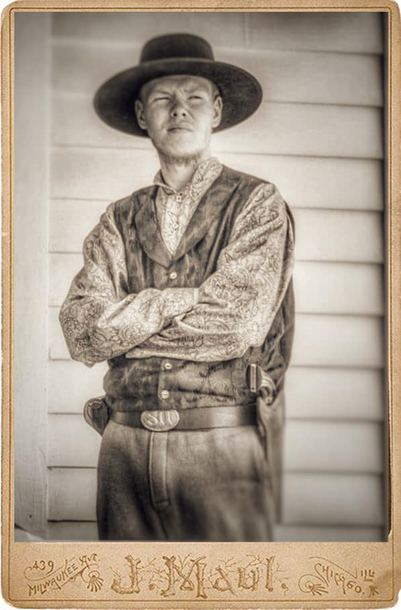
J.Purkaple
Mr. J. P. Miles of Shoal Creek, Missouri.
Born at Hannibal, Missouri, but lived the first few years of his life in Winchester, in Scott County, Illinois. Then moved with his family back into Missouri, and soon after to southwestern Clay County. His father was a preacher who rode the Baptist circuit. His mother was briefly a schoolteacher before quitting it to raise her children. He planned on following his father into the ministry, and did receive his ordination from the Southern Baptist Convention, but first took up the occupation of wandering vagabond. While in Oregon County, war broke out. Lied about his age to enlist in the fall of 1862. Mustered in near Batesville, February 1863, as a teamster. First saw action at the Battle of Hartville, and served in Col. Burbridge's Regiment of Gen. Marmaduke's Missouri Cavalry all through Price's Raid unto the war's end in June 1865. Penniless and defeated, he migrated back to Clay County and found his way up to Shoal Creek, where he has since lived and can usually be found smoking and playing cards at the inn. He is never without his trusty revolver, but being scatterbrained he frequently forgets to load it before attempting to fire.
Mr. J. P. Miles of Shoal Creek, Missouri.
Born at Hannibal, Missouri, but lived the first few years of his life in Winchester, in Scott County, Illinois. Then moved with his family back into Missouri, and soon after to southwestern Clay County. His father was a preacher who rode the Baptist circuit. His mother was briefly a schoolteacher before quitting it to raise her children. He planned on following his father into the ministry, and did receive his ordination from the Southern Baptist Convention, but first took up the occupation of wandering vagabond. While in Oregon County, war broke out. Lied about his age to enlist in the fall of 1862. Mustered in near Batesville, February 1863, as a teamster. First saw action at the Battle of Hartville, and served in Col. Burbridge's Regiment of Gen. Marmaduke's Missouri Cavalry all through Price's Raid unto the war's end in June 1865. Penniless and defeated, he migrated back to Clay County and found his way up to Shoal Creek, where he has since lived and can usually be found smoking and playing cards at the inn. He is never without his trusty revolver, but being scatterbrained he frequently forgets to load it before attempting to fire.
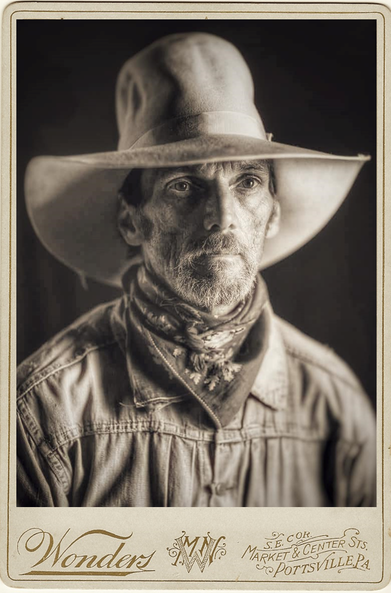
Steve Reeves
My name is Steve Reeves i have also done business as a hemp trader from Jackson County I served the people of Missouri as a member of the Ninth Missouri Cav I mostly just want to be left alone by the sheriff and his deputies but still am willing to help protect the people of our town.
My name is Steve Reeves i have also done business as a hemp trader from Jackson County I served the people of Missouri as a member of the Ninth Missouri Cav I mostly just want to be left alone by the sheriff and his deputies but still am willing to help protect the people of our town.
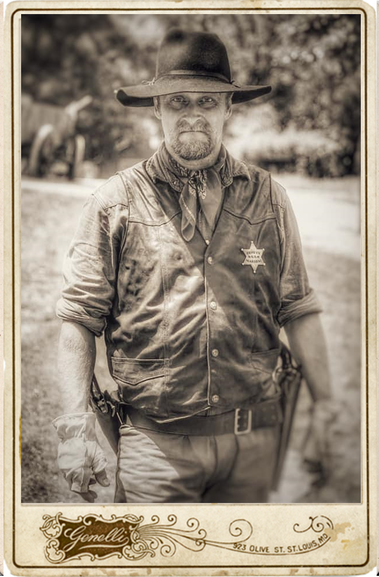
Jerod Green
My name is US Marshal Green from Lincoln Co. retired law man at Shoal Creek Helping Sherriff Roe. I agreed too be his deputy to help him.
My name is US Marshal Green from Lincoln Co. retired law man at Shoal Creek Helping Sherriff Roe. I agreed too be his deputy to help him.
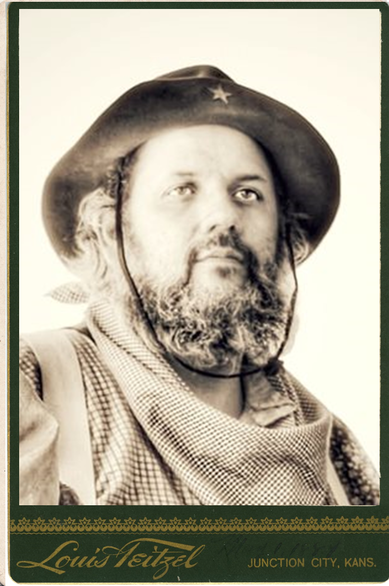
Cary S. Rinkenbaugh Sr.
My name is Ricky “hillbilly” Bobby and I’m known around town as the most lovable guy that can’t be around an open flame. I want to be your next mayor so if you’re looking to sell your vote than I’m looking to buy it.
My name is Ricky “hillbilly” Bobby and I’m known around town as the most lovable guy that can’t be around an open flame. I want to be your next mayor so if you’re looking to sell your vote than I’m looking to buy it.
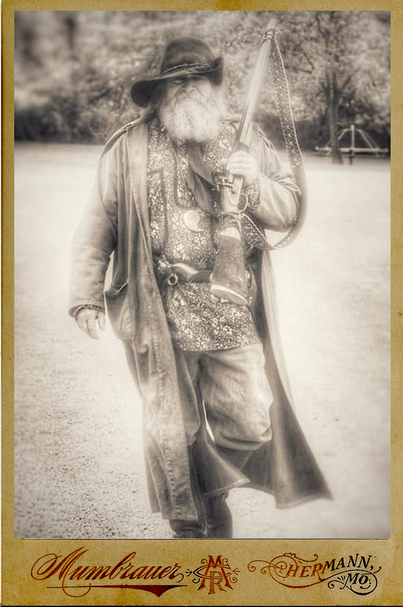
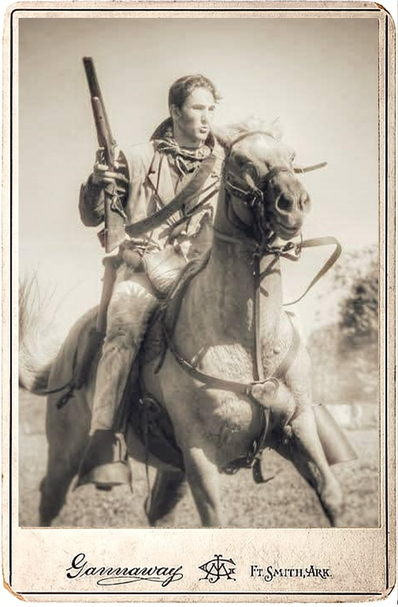
Colby Rollins
My name is Jesse W. James. Leader of the James/Younger gang from Kearney, Missouri.
My name is Jesse W. James. Leader of the James/Younger gang from Kearney, Missouri.
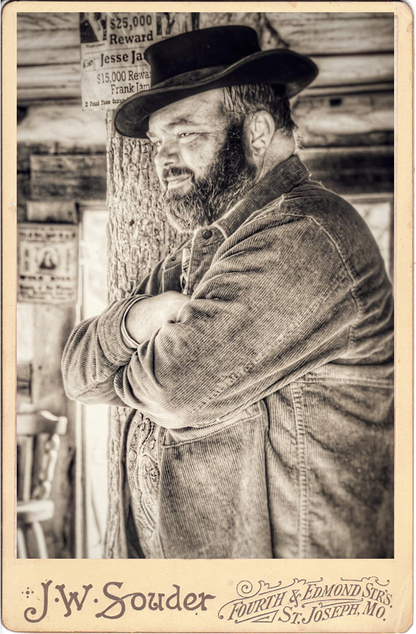
James Crofutt
I was born in the month of April in the year 1828, at Fort Bluecoat (later renamed Fort Harding) near the Great Waterfalls of the unincorporated Territory out West. This territory would go through a number of name changes over the years but it ultimately became the Montana territory in May of 1864.
To get an understanding of how I got that far west to be born at that location in such a time before it was ever populated you need to know my father and my grandfather’s backstory.
My grandfather and his father before him were Sailors and made a living off of the ocean fishing and serving on ships that transported goods. My Grandfather fought with the Connecticut Infantry during the War of Independence & later finished out as part of the new American Navy. For services rendered during the war, he was granted a tract of land out on the Ohio frontier along that great river. So, he headed west with his wife and settled on this land & so it was that my father was born in Ohio.
My father grew up working the farm & later he worked on a ship that ferried supplies up & down the Ohio river.
When war with England broke out again, my father joined the Army and served during the War of 1812. He returned to Ohio after the war & resumed working the Ohio & Mississippi Rivers until meeting my mother & deciding to marry. Soon after for whatever reason they headed west & he took a contracting job for the Government as an Army Sutler.
In 1827 he was at Fort Floyd at the mouth of the Yellowstone. While there during that Summer the Army established a new fort farther up the river near the Great Falls & it was garrisoned by a detachment of engineers who were studying the falls & protected by a detachment of some Dragoons. My father was sent there soon after the fort was built to become its Sutler and so by serving those men, he carved out a meager living as best he could. That is how we got to that place so far west & so far away from civilization. The only real people out that far were the Army, some fur traders & the Blackfeet Indians.
However, it was at that place in which I was born in the spring of 1828 near the Great Falls of the Missouri River.
By 1834 the Army had abandoned this fort and my father's contract expiring he decided to head back east to civilization so that I could be raised more properly. So, he moved our family down the Missouri River to the state of Missouri & settled in St. Joseph, working at first on a river boat and later at a mercantile store.
In 1836 the Platte Purchase added the final parts of the land to the state of Missouri & Andrew County was established. My father was able to buy some land just on the southern border of the new Andrew County (just north of St. Joseph) and there he started farming and built a house. This is where I would grow up.
In 1846 I was 18 years old & that year war with Mexico was declared. I was young and eager at that age looking for excitement so I enlisted with the Powells Battalion of Missouri Mounted Volunteers. I was but a Private & I was put into Company D which was organized by Andrew County men. We enlisted in Savannah Missouri. We were sent to Fort Leavenworth and joined with the other companies that would form our battalion & we numbered about 400 men. But it was at this fort in Kansas - that is where our battalion was mustered into United States service. We were all thinking that we were going to be sent down to Mexico to fight them & be able to do battle, but for whatever reason, that did not come to pass. We marched north into the Nebraska territory to a place called Table Creek, near the present-day site of Nebraska City, arriving there about mid-December. And so that is where we spent the winter of 1847 to 1848. Our time was spent with a lot of drills and army discipline and we became real soldiers over a period of that time with Army routine. But we never understand why we hadn’t been sent down to Mexico. But during this time is when I made good friends with Mr. Samuel Pendleton who was also from Andrew County.
We broke camp in late April of 1848 and marched west deeper into the Nebraska territory. We march to a point on the Platte River and arrive there sometime in early June, and we built & established a Fort on the south bank of the Nebraska or Great Platte River, just below the head of the grand island, & called “Fort Child’s” (later to be renamed Fort Kearny) & we remained there until October where our enlistments expired. At that time Regular US Army troops arrived & relieved us & so we marched back to Fort Leavenworth & it was early November but we were mustered out of service at Fort Leavenworth Kansas - having served a year & one half in the U.S. Army. We Never saw any battles just a few unknown skirmishes with Indians. The Army wasn’t all the glory & excitement that I had anticipated, but I did a lot of growing up while in its service.
I returned home back to my father’s farm & worked there for a while but 1849 found me down in St. Joseph working on a riverboat that delivered supplies up and down the river. We got as far north as Dakota territory and when we went down the river we got as far as Glasgow MO. - But we were based out of St. Joseph and for most of that year I was working the ship as part of the crew. It was a meager living & I was gone a lot from my father’s farm.
In 1850 I had an opportunity to go on an adventure with my friend Samuel Pendleton from the Mexican War and his younger brother and three cousins in a wagon drawn by an ox team. I decided to go along when they invited me and so we headed west to California to see if we could strike it rich in the gold mines.
We worked in the gold mines in California until July of the following year. Then heading home, we did a passage in San Francisco to go to Panama. We went down the Mexican coast to Acapules and it was here with the company of 18 men we left the vessel & engaged a pack train to carry us to the city of Mexico. After a few weeks at that place, we rode to Veracruz, and freight wagons made a total distance of 630 miles traveled on land. At Veracruz took passage on a sailing vessel to the mouth of the Mississippi river and traveled from New Orleans to Saint Joseph by water. We were gone for 18 months. Throughout this adventure, I had only managed to mine about $1500 worth of gold.
Upon my return home, I bought some land in St. Joseph and built a house, and decided to settle down. In 1853 I married Ms. Diana Grieme of St. Joseph. Her father was a German sailor who worked the river boats. I did some farming but not wanting to return to riverboat work because I wanted to stay home & raise a family so I studied law for a year or so but that really wasn’t to my liking. So, I took a job working for the local St. Joseph Newspaper and that is where I began to learn the printer's trade. I did that for 3 years until 1857 when work began on the St. Joseph side of the Hannibal & St. Joseph Railroad. I helped build the train depot & working at laying the track & building it eastward. An accidental interaction with Mr. Everette Peabody (who was the chief engineer in charge of the construction of the railroad) occurred & for some reason he took a liking to me. Over the next few months, a friendship developed, and before I knew it, he had me off the main work crew and started teaching me the engineering trade and I became his assistant. I did this every day for many years until the railroad was complete. And I am thinking that was right before the outbreak of the big rebellion by the southern states.
In 1861 at the breaking out of hostilities & war being declared, Everett Peabody (my friend) started recruiting an Infantry regiment to serve the Union. I of course enlisted & knowing that my Country was in peril & with President Lincoln’s call for volunteers I immediately said yes and joined Peabody in his efforts to raise a regiment. I was at first but a private with musket in hand & part of the 13th Missouri Infantry Vols, and served as such until August of 1861 I was promoted to Sergeant Major which I served through the Lexington Missouri siege and actively fired my musket during the battle where we were captured.
After being held as prisoners for a little while at Lexington Missouri by the Missouri State Guard (Pro Confederate rebels) we were paroled and allowed to return to Saint Joseph. That was in September of 1861 when that fight took place. However, A month or two later we receive orders to re-organize the regiment and found out that we would be re-designated to the 25th Missouri infantry.
I of course immediately was working for Colonel Peabody on his regimental staff and helping re-organize the old companies and get them going at some point, I don’t really recall but we received a bunch of Irishman from Van Horn’s Kansas City battalion and I was promoted to Captain and made a Company Commander. I think it was Company G but That was so long ago I’m not really sure. Anyway, I served with the 25th Missouri Infantry and fought at the battle of Pittsburg Landing in Tennessee (but most folks call it the battle of Shiloh) in which my good friend Col. Peabody was killed. By Gods hand somehow, I made it through that fight both of the days & my Irish boys fought like tigers they did!
Sometime after the battle of Pittsburgh Landing (aka Shiloh), we were in Mississippi and I received a letter from the Governor of Missouri, offering me a Commission to Lt. Colonel and asking me to help organize a new battalion. Apparently, my friend Peabody had recommended me to the Governor for such a post but he never told me. I think he was wanting to surprise me but we never got that moment because he was killed at Pittsburgh Landing. I of course accepted the Commission & returned to Missouri & began organizing the U.S. Muddy River Battalion. This battalion was unique in the aspect that each company came from a different regiment & for whatever reason they were detached away. Also, not every company was a Missouri Company we had companies from Missouri, Kansas, Iowa, the Nebraska Territory & even one from the US Regulars. However, we were officially still a Missouri Volunteers organization & my Commission came from Governor Hamilton Gamble. Within a few short months, the Battalion had grown large enough that I was promoted to full Colonel.
Served in command of the US Muddy River Battalion and we actively fought in many battles including, Prairie Grove in December of 1862.
By early 1863 I became a Brigade Commander which included the Muddy River Battalion, and the Frontier & Territorial Battalions. We were assigned to the First Federal Division & I remember that for some reason our division was temporarily sent east in the summer of 1863 & we were attached to the Army of the Potomac and saw heavy action at the Battle of Gettysburg. It was right before this battle that I was made a brevet Brigadier General of Volunteers which was a proper rank for my command. After Gettysburg, our division was returned west and served in Missouri, Tennessee & Kentucky, and those regions as needed. We saw more action at places such as Perryville, Stones River & many other fights that are too numerous to write out as a lot of these tend to blur together.
Sometime in early 1864, I was promoted to full Brigadier General & assigned Command of the First Federal Division. I commanded the Division for the remainder of the war. I do remember that in the fall of 1864, I had at one point my Division HQ established at Fort Davidson in Pilot Knob Missouri when General Sterling Price invaded the State of Missouri. He attacked Pilot Knob and we put up a spirited fight but had to withdraw that evening. Prices Missouri Campaign was set into motion & we participated against this Rebel invasion my division fought at several other places such as Lees town, Glasgow, & the Battle of Westport (being the only full federal Infantry at that battle) near Kansas City. Shortly after this fight, I received word that I was promoted to Brevet Major General & fully authorized by the Congress of the United States.
In November we were sent to Tennessee and joined the Army around the Nashville area. Fully participating in the fighting around Franklin & Nashville. We stayed in Tennessee doing Guard duty but an expedition in the spring of 1865 which resulted in our last fight of the War at Fort Blakley Alabama. By April the Rebels had laid down their arms and the war was all but over. My division was disbanded in June of 1865 and I returned back to St. Louis. At that place the Battalions of Muddy River, Frontier & Territorial were mustered out. I had to stay in St. Louis doing desk duty until November of that year. My wife was able to join me though which was a very acceptable thing for me. It was during this period of time that we began talking about relocating out of St. Joseph & finding a smaller community to live in. Perhaps in Platte or Clay County. But in November of 1865, I was finally mustered out of the Army & we returned home to the farm near St. Joseph up in Andrew County.
Unfortunately, during the war, my wife had to leave the farm and move into the town of Saint Joseph just for protection from the marauding guerrillas who pretty much had ravaged my farm & burned most of it down as retribution against me serving the union during the war and wearing the blue coat.
With my son's help (who had also served during the war but having been wounded & Shiloh & mustered out, he finished the war serving in the Enrolled Missouri Militia).
We began rebuilding the farm. It took us most of that year to get things back properly & up and running again.
In 1867 I decided to move to Clay County a small town that I remembered having fought a small skirmish back in 1862. It was Shoal Creek & the town had caught my eye & I had told myself that the town of Shoal Creek might be a good place to one day move. So, I gave the farm to my son and his family, and my wife and I headed to Shoal Creek. We were able to buy some land just on the outskirts of town. I built a small house and a barn and basically, we at first did some farming. But it didn’t take long before I realized that the town lacked a newspaper. And with my past experience in the printer's trade, I decided to establish a town newspaper and open up a printing business. I was able to buy a printing press and get started. I was working out of my barn though but never the less the newspaper was well received by my neighbors and most of the town folk.
Although not everyone was pleased because I did have backing from the Republican Party. It was them who had helped get me my press & started so I had to oblige them with the support of the Republicans. That didn’t go too well with some especially those who had served during the war in the rebel army. Nevertheless, I was able to be respectful for the most part and didn’t have too many troubles for the first few years, but that was largely due to the help of sheriff Joseph Roe who kept the peace in Shoal Creek.
In 1868 I bought the Crossroads Inn right in the heart of Shoal Creek just across from the town mercantile. I did it mostly for the express purpose of being able to easier distribute my town newspaper more. But we did also establish it as a small inn for travelers passing through & a place where local town folk could get a drink or some extra food supplies that the mercantile didn’t have. We also established a telegraph line and received the town mail. All of this extra stuff supplemented my already small income from the Newspaper & other printing jobs but made me an active part of the community & well-known.
In 1870 (I think it was) I helped establish a Grand Army of the Republic post in Shoal Creek for those of us who were Union Veterans. GAR post #595 the Everett Peabody Camp (in honor of my friend who had died in 1862 at Shiloh). I became very involved.
I have lived at Shoal Creek now for over a decade (it being the year 1879) & have found it to be a nice town. Peaceful for most but just any town back during that period we did have our flare-ups & run inns with the likes of the James gang & Bad Betty and her gang. I even got held up once by Bad Betty. I look back now on it and can chuckle about although losing those greenbacks did hurt for a spell.
We attend the town Church under the Reverend Darold Younger. My wife plays Oregon every Sunday & the Reverend's passionate sermons help keep us on the straight and narrow.
On occasion, we are able to take the train out of Liberty which is only a few miles east of Shoal Creek & we are able to return to St. Joseph and visit my son and grandchildren. But I also sometimes go down to Blue Mills landing and catch the riverboat and ride it up to St. Joseph by way of the Missouri River. I spent many years working on it so of course for me it’s a lot of memories in my older years.
Well, that’s pretty much my story up to the point. I have seen a lot of history and I’ve been a Union man – and a God-fearing Christian. I’m still at Shoal Creek as a citizen of that town and watching it start to grow. Not sure what else to say but if ever in Shoal Creek I can usually be found at the Cross Roads Inn selling newspapers and hosting folks.
I was born in the month of April in the year 1828, at Fort Bluecoat (later renamed Fort Harding) near the Great Waterfalls of the unincorporated Territory out West. This territory would go through a number of name changes over the years but it ultimately became the Montana territory in May of 1864.
To get an understanding of how I got that far west to be born at that location in such a time before it was ever populated you need to know my father and my grandfather’s backstory.
My grandfather and his father before him were Sailors and made a living off of the ocean fishing and serving on ships that transported goods. My Grandfather fought with the Connecticut Infantry during the War of Independence & later finished out as part of the new American Navy. For services rendered during the war, he was granted a tract of land out on the Ohio frontier along that great river. So, he headed west with his wife and settled on this land & so it was that my father was born in Ohio.
My father grew up working the farm & later he worked on a ship that ferried supplies up & down the Ohio river.
When war with England broke out again, my father joined the Army and served during the War of 1812. He returned to Ohio after the war & resumed working the Ohio & Mississippi Rivers until meeting my mother & deciding to marry. Soon after for whatever reason they headed west & he took a contracting job for the Government as an Army Sutler.
In 1827 he was at Fort Floyd at the mouth of the Yellowstone. While there during that Summer the Army established a new fort farther up the river near the Great Falls & it was garrisoned by a detachment of engineers who were studying the falls & protected by a detachment of some Dragoons. My father was sent there soon after the fort was built to become its Sutler and so by serving those men, he carved out a meager living as best he could. That is how we got to that place so far west & so far away from civilization. The only real people out that far were the Army, some fur traders & the Blackfeet Indians.
However, it was at that place in which I was born in the spring of 1828 near the Great Falls of the Missouri River.
By 1834 the Army had abandoned this fort and my father's contract expiring he decided to head back east to civilization so that I could be raised more properly. So, he moved our family down the Missouri River to the state of Missouri & settled in St. Joseph, working at first on a river boat and later at a mercantile store.
In 1836 the Platte Purchase added the final parts of the land to the state of Missouri & Andrew County was established. My father was able to buy some land just on the southern border of the new Andrew County (just north of St. Joseph) and there he started farming and built a house. This is where I would grow up.
In 1846 I was 18 years old & that year war with Mexico was declared. I was young and eager at that age looking for excitement so I enlisted with the Powells Battalion of Missouri Mounted Volunteers. I was but a Private & I was put into Company D which was organized by Andrew County men. We enlisted in Savannah Missouri. We were sent to Fort Leavenworth and joined with the other companies that would form our battalion & we numbered about 400 men. But it was at this fort in Kansas - that is where our battalion was mustered into United States service. We were all thinking that we were going to be sent down to Mexico to fight them & be able to do battle, but for whatever reason, that did not come to pass. We marched north into the Nebraska territory to a place called Table Creek, near the present-day site of Nebraska City, arriving there about mid-December. And so that is where we spent the winter of 1847 to 1848. Our time was spent with a lot of drills and army discipline and we became real soldiers over a period of that time with Army routine. But we never understand why we hadn’t been sent down to Mexico. But during this time is when I made good friends with Mr. Samuel Pendleton who was also from Andrew County.
We broke camp in late April of 1848 and marched west deeper into the Nebraska territory. We march to a point on the Platte River and arrive there sometime in early June, and we built & established a Fort on the south bank of the Nebraska or Great Platte River, just below the head of the grand island, & called “Fort Child’s” (later to be renamed Fort Kearny) & we remained there until October where our enlistments expired. At that time Regular US Army troops arrived & relieved us & so we marched back to Fort Leavenworth & it was early November but we were mustered out of service at Fort Leavenworth Kansas - having served a year & one half in the U.S. Army. We Never saw any battles just a few unknown skirmishes with Indians. The Army wasn’t all the glory & excitement that I had anticipated, but I did a lot of growing up while in its service.
I returned home back to my father’s farm & worked there for a while but 1849 found me down in St. Joseph working on a riverboat that delivered supplies up and down the river. We got as far north as Dakota territory and when we went down the river we got as far as Glasgow MO. - But we were based out of St. Joseph and for most of that year I was working the ship as part of the crew. It was a meager living & I was gone a lot from my father’s farm.
In 1850 I had an opportunity to go on an adventure with my friend Samuel Pendleton from the Mexican War and his younger brother and three cousins in a wagon drawn by an ox team. I decided to go along when they invited me and so we headed west to California to see if we could strike it rich in the gold mines.
We worked in the gold mines in California until July of the following year. Then heading home, we did a passage in San Francisco to go to Panama. We went down the Mexican coast to Acapules and it was here with the company of 18 men we left the vessel & engaged a pack train to carry us to the city of Mexico. After a few weeks at that place, we rode to Veracruz, and freight wagons made a total distance of 630 miles traveled on land. At Veracruz took passage on a sailing vessel to the mouth of the Mississippi river and traveled from New Orleans to Saint Joseph by water. We were gone for 18 months. Throughout this adventure, I had only managed to mine about $1500 worth of gold.
Upon my return home, I bought some land in St. Joseph and built a house, and decided to settle down. In 1853 I married Ms. Diana Grieme of St. Joseph. Her father was a German sailor who worked the river boats. I did some farming but not wanting to return to riverboat work because I wanted to stay home & raise a family so I studied law for a year or so but that really wasn’t to my liking. So, I took a job working for the local St. Joseph Newspaper and that is where I began to learn the printer's trade. I did that for 3 years until 1857 when work began on the St. Joseph side of the Hannibal & St. Joseph Railroad. I helped build the train depot & working at laying the track & building it eastward. An accidental interaction with Mr. Everette Peabody (who was the chief engineer in charge of the construction of the railroad) occurred & for some reason he took a liking to me. Over the next few months, a friendship developed, and before I knew it, he had me off the main work crew and started teaching me the engineering trade and I became his assistant. I did this every day for many years until the railroad was complete. And I am thinking that was right before the outbreak of the big rebellion by the southern states.
In 1861 at the breaking out of hostilities & war being declared, Everett Peabody (my friend) started recruiting an Infantry regiment to serve the Union. I of course enlisted & knowing that my Country was in peril & with President Lincoln’s call for volunteers I immediately said yes and joined Peabody in his efforts to raise a regiment. I was at first but a private with musket in hand & part of the 13th Missouri Infantry Vols, and served as such until August of 1861 I was promoted to Sergeant Major which I served through the Lexington Missouri siege and actively fired my musket during the battle where we were captured.
After being held as prisoners for a little while at Lexington Missouri by the Missouri State Guard (Pro Confederate rebels) we were paroled and allowed to return to Saint Joseph. That was in September of 1861 when that fight took place. However, A month or two later we receive orders to re-organize the regiment and found out that we would be re-designated to the 25th Missouri infantry.
I of course immediately was working for Colonel Peabody on his regimental staff and helping re-organize the old companies and get them going at some point, I don’t really recall but we received a bunch of Irishman from Van Horn’s Kansas City battalion and I was promoted to Captain and made a Company Commander. I think it was Company G but That was so long ago I’m not really sure. Anyway, I served with the 25th Missouri Infantry and fought at the battle of Pittsburg Landing in Tennessee (but most folks call it the battle of Shiloh) in which my good friend Col. Peabody was killed. By Gods hand somehow, I made it through that fight both of the days & my Irish boys fought like tigers they did!
Sometime after the battle of Pittsburgh Landing (aka Shiloh), we were in Mississippi and I received a letter from the Governor of Missouri, offering me a Commission to Lt. Colonel and asking me to help organize a new battalion. Apparently, my friend Peabody had recommended me to the Governor for such a post but he never told me. I think he was wanting to surprise me but we never got that moment because he was killed at Pittsburgh Landing. I of course accepted the Commission & returned to Missouri & began organizing the U.S. Muddy River Battalion. This battalion was unique in the aspect that each company came from a different regiment & for whatever reason they were detached away. Also, not every company was a Missouri Company we had companies from Missouri, Kansas, Iowa, the Nebraska Territory & even one from the US Regulars. However, we were officially still a Missouri Volunteers organization & my Commission came from Governor Hamilton Gamble. Within a few short months, the Battalion had grown large enough that I was promoted to full Colonel.
Served in command of the US Muddy River Battalion and we actively fought in many battles including, Prairie Grove in December of 1862.
By early 1863 I became a Brigade Commander which included the Muddy River Battalion, and the Frontier & Territorial Battalions. We were assigned to the First Federal Division & I remember that for some reason our division was temporarily sent east in the summer of 1863 & we were attached to the Army of the Potomac and saw heavy action at the Battle of Gettysburg. It was right before this battle that I was made a brevet Brigadier General of Volunteers which was a proper rank for my command. After Gettysburg, our division was returned west and served in Missouri, Tennessee & Kentucky, and those regions as needed. We saw more action at places such as Perryville, Stones River & many other fights that are too numerous to write out as a lot of these tend to blur together.
Sometime in early 1864, I was promoted to full Brigadier General & assigned Command of the First Federal Division. I commanded the Division for the remainder of the war. I do remember that in the fall of 1864, I had at one point my Division HQ established at Fort Davidson in Pilot Knob Missouri when General Sterling Price invaded the State of Missouri. He attacked Pilot Knob and we put up a spirited fight but had to withdraw that evening. Prices Missouri Campaign was set into motion & we participated against this Rebel invasion my division fought at several other places such as Lees town, Glasgow, & the Battle of Westport (being the only full federal Infantry at that battle) near Kansas City. Shortly after this fight, I received word that I was promoted to Brevet Major General & fully authorized by the Congress of the United States.
In November we were sent to Tennessee and joined the Army around the Nashville area. Fully participating in the fighting around Franklin & Nashville. We stayed in Tennessee doing Guard duty but an expedition in the spring of 1865 which resulted in our last fight of the War at Fort Blakley Alabama. By April the Rebels had laid down their arms and the war was all but over. My division was disbanded in June of 1865 and I returned back to St. Louis. At that place the Battalions of Muddy River, Frontier & Territorial were mustered out. I had to stay in St. Louis doing desk duty until November of that year. My wife was able to join me though which was a very acceptable thing for me. It was during this period of time that we began talking about relocating out of St. Joseph & finding a smaller community to live in. Perhaps in Platte or Clay County. But in November of 1865, I was finally mustered out of the Army & we returned home to the farm near St. Joseph up in Andrew County.
Unfortunately, during the war, my wife had to leave the farm and move into the town of Saint Joseph just for protection from the marauding guerrillas who pretty much had ravaged my farm & burned most of it down as retribution against me serving the union during the war and wearing the blue coat.
With my son's help (who had also served during the war but having been wounded & Shiloh & mustered out, he finished the war serving in the Enrolled Missouri Militia).
We began rebuilding the farm. It took us most of that year to get things back properly & up and running again.
In 1867 I decided to move to Clay County a small town that I remembered having fought a small skirmish back in 1862. It was Shoal Creek & the town had caught my eye & I had told myself that the town of Shoal Creek might be a good place to one day move. So, I gave the farm to my son and his family, and my wife and I headed to Shoal Creek. We were able to buy some land just on the outskirts of town. I built a small house and a barn and basically, we at first did some farming. But it didn’t take long before I realized that the town lacked a newspaper. And with my past experience in the printer's trade, I decided to establish a town newspaper and open up a printing business. I was able to buy a printing press and get started. I was working out of my barn though but never the less the newspaper was well received by my neighbors and most of the town folk.
Although not everyone was pleased because I did have backing from the Republican Party. It was them who had helped get me my press & started so I had to oblige them with the support of the Republicans. That didn’t go too well with some especially those who had served during the war in the rebel army. Nevertheless, I was able to be respectful for the most part and didn’t have too many troubles for the first few years, but that was largely due to the help of sheriff Joseph Roe who kept the peace in Shoal Creek.
In 1868 I bought the Crossroads Inn right in the heart of Shoal Creek just across from the town mercantile. I did it mostly for the express purpose of being able to easier distribute my town newspaper more. But we did also establish it as a small inn for travelers passing through & a place where local town folk could get a drink or some extra food supplies that the mercantile didn’t have. We also established a telegraph line and received the town mail. All of this extra stuff supplemented my already small income from the Newspaper & other printing jobs but made me an active part of the community & well-known.
In 1870 (I think it was) I helped establish a Grand Army of the Republic post in Shoal Creek for those of us who were Union Veterans. GAR post #595 the Everett Peabody Camp (in honor of my friend who had died in 1862 at Shiloh). I became very involved.
I have lived at Shoal Creek now for over a decade (it being the year 1879) & have found it to be a nice town. Peaceful for most but just any town back during that period we did have our flare-ups & run inns with the likes of the James gang & Bad Betty and her gang. I even got held up once by Bad Betty. I look back now on it and can chuckle about although losing those greenbacks did hurt for a spell.
We attend the town Church under the Reverend Darold Younger. My wife plays Oregon every Sunday & the Reverend's passionate sermons help keep us on the straight and narrow.
On occasion, we are able to take the train out of Liberty which is only a few miles east of Shoal Creek & we are able to return to St. Joseph and visit my son and grandchildren. But I also sometimes go down to Blue Mills landing and catch the riverboat and ride it up to St. Joseph by way of the Missouri River. I spent many years working on it so of course for me it’s a lot of memories in my older years.
Well, that’s pretty much my story up to the point. I have seen a lot of history and I’ve been a Union man – and a God-fearing Christian. I’m still at Shoal Creek as a citizen of that town and watching it start to grow. Not sure what else to say but if ever in Shoal Creek I can usually be found at the Cross Roads Inn selling newspapers and hosting folks.
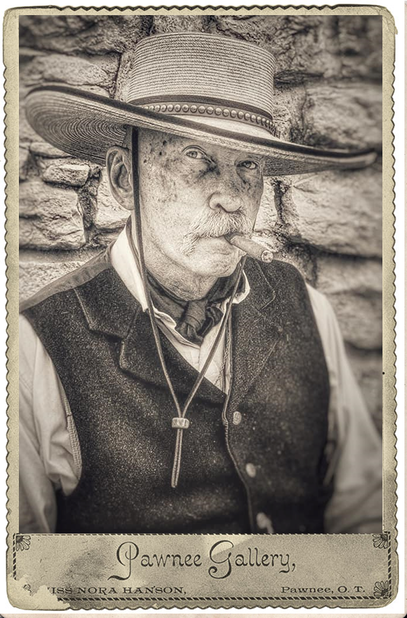
G
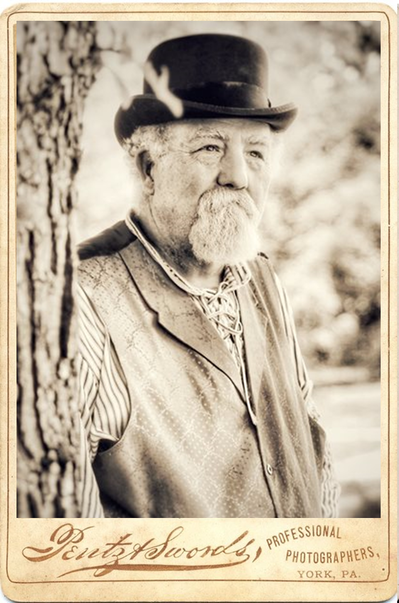
T
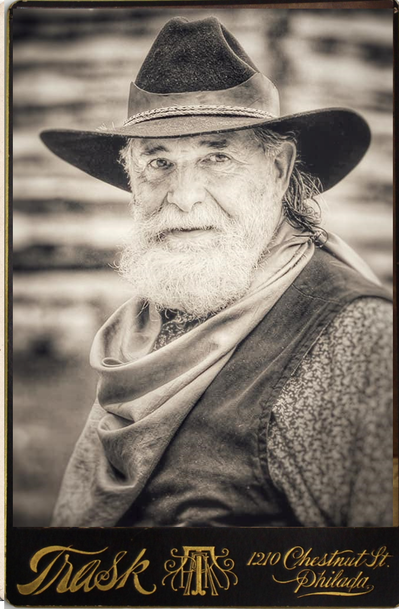
T
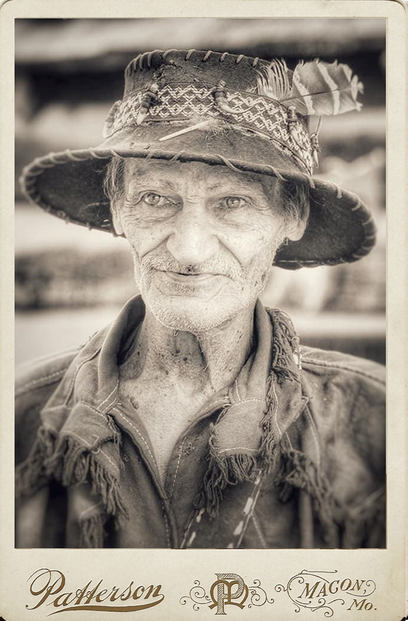
t
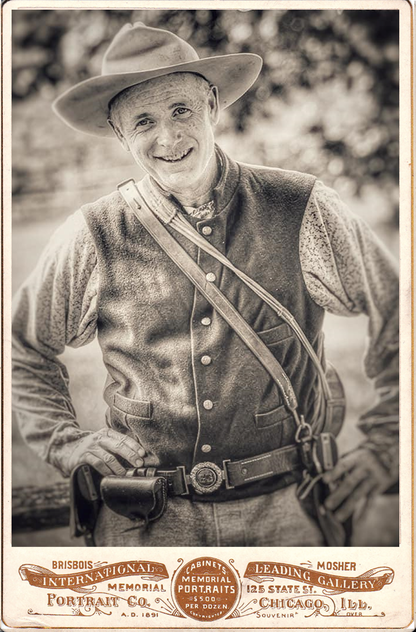
t
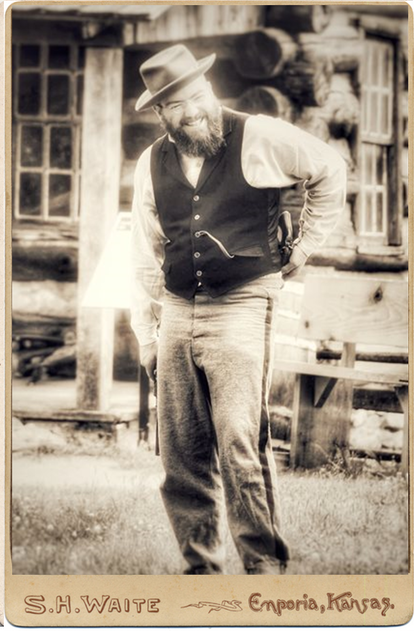
t
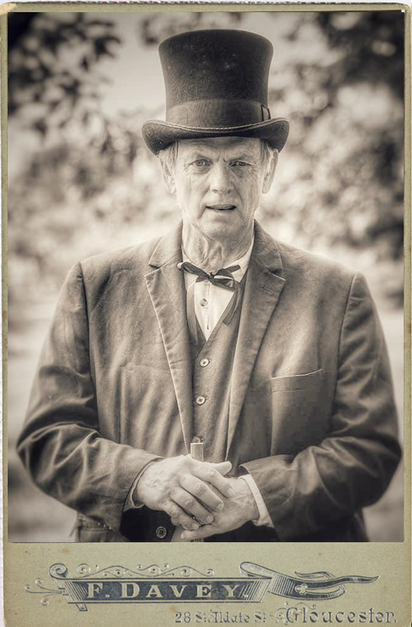
t
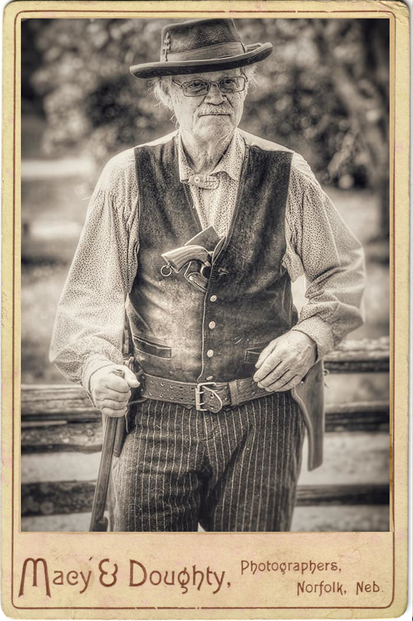
t
